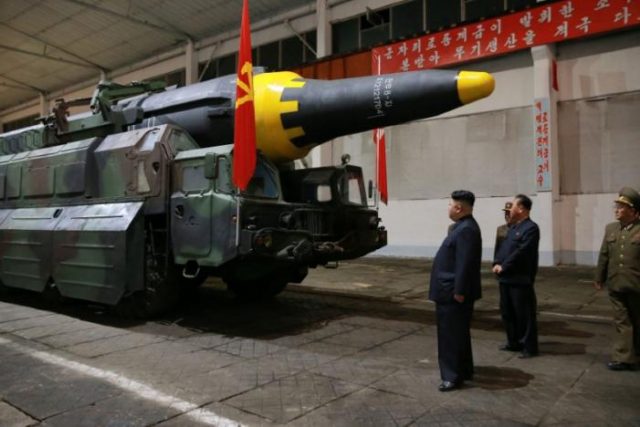
SEOUL — North Korea said on Monday it had successfully conducted a mid- to-long-range missile test and would continue such launches “any time, any place,” defying UN Security Council resolutions and warnings from the United States.
North Korea, which regularly threatens to destroy the United States in a sea of flames, has accused Washington of pushing the Korean peninsula to the brink of nuclear war with recent military drills with South Korea and Japan.
The North’s KCNA news agency said Sunday’s test launch verified the homing feature of the warhead that allowed it to survive “under the worst re-entry situation” and accurately detonate.
It also tested the North’s capability to carry a “large-size heavy nuclear warhead,” KCNA said.
“The test-fire proved to the full all the technical specifications of the rocket … like guidance and stabilization systems … and reconfirmed the reliability of new rocket engine under the practical flight circumstances,” KCNA said.
The test “represents a level of performance never before seen from a North Korean missile”, John Schilling, an aerospace expert, said in an analysis on the US-based 38 North website.
“It appears to have not only demonstrated an intermediate-range ballistic missile that might enable them to reliably strike the US base at Guam, but more importantly, may represent a substantial advance to developing an intercontinental ballistic missile.”
The missile flew 787 kilometers (489 miles) on a trajectory reaching an altitude of 2,111.5 kilometers (1,312 miles), KCNA said.
North Korea has been developing a long-range missile capable of striking the mainland United States mounted with a nuclear warhead. That would require a flight of 8,000 kilometers (4,800 miles) or more and technology to ensure a warhead’s stable re-entry into the atmosphere.
“The test-firing of ICBMs will occur at any time and place, at the will of North Korea’s highest leadership,” North Korea’s ambassador to China, Ji Jae Ryong, told reporters in Beijing on Monday, a day before the UN Security Council meets in New York to discuss the test.
North Korea has defied calls to curb its missile and nuclear weapons programs, testing its relationship with its lone major ally, China, which has always called for talks to resolve the issue, and prompting South Korea’s new president, Moon Jae-in, to “strongly condemn” Sunday’s action.
‘Harmful and dangerous’
US President Donald Trump warned in an interview with Reuters this month that a “major, major conflict” with North Korea was possible. In a show of force, the United States sent an aircraft carrier strike group, led by the USS Carl Vinson, to waters off the Korean peninsula to conduct drills with South Korea and Japan.
It says the “era of strategic patience” with North Korea is over.
Russian President Vladimir Putin said in Beijing that Moscow was opposed to any new countries acquiring nuclear weapons, but that the world should talk to North Korea rather than threaten it.
“I want to confirm that we are categorically against the expansion of the club of nuclear powers, including with the Korean peninsula and North Korea,” said Putin, who said any such move would be “harmful and dangerous.”
“But at the same time, we understand that what we have observed in the world recently, and specifically flagrant violations of international law and incursions into the territory of foreign states, changes in regime, lead to such kinds of arms races.”
Putin did not specify what countries he had in mind, but he has in the past repeatedly criticized the United States for military operations in Iraq, Libya and Syria, and accused it of trying to oust legitimate governments.
The Russian Defense Ministry said on Sunday that the missile crashed into the Sea of Japan around 500 kilometers (310 miles) off the Russian coast.
The North has successfully launched long-range rockets twice to put objects into space. But many had believed it was some years away from mastering re-entry expertise for perfecting an ICBM, which uses similar engineering in early flight stages.
North Korea’s official Rodong Sinmun newspaper devoted half of its six-page Monday edition to coverage of the missile test, with vivid color photographs of the launch and jubilant leader Kim Jong Un celebrating with military officers.
The pictures featured a long nose-coned projectile that appeared to be similar to missiles displayed during an April 15 military parade for the birth anniversary of state founder Kim Il Sung, the current leader’s grandfather.
The nose cone resembles that of the KN-08 ICBM the North is believed to be developing, and the lofted trajectory tests re-entry by putting the missile through extra stress, said Joshua Pollack of the US-based Non-proliferation Review.
“This is an advanced missile, if their claims are true.”
KCNA said Kim accused the United States of “browbeating” countries that “have no nukes,” warning Washington not to misjudge the reality that its mainland is in the North’s “sighting range for strike.”
The United States called the missile launch a message to South Korea, days after Moon took office pledging to engage Pyongyang in dialogue and keep up international pressure to impede the North’s arms pursuit.
Two senior national security advisers to Trump will meet Moon’s top foreign policy adviser, Chung Eui-yong, in Seoul on Tuesday to discuss a summit of the leaders and the North’s missile test, a source with direct knowledge of the meeting said.









